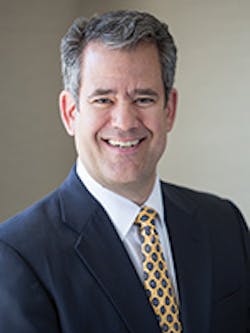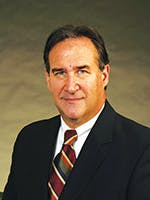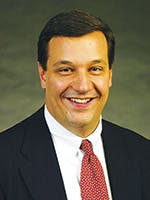As 2015 became 2016, one inevitable question was whether the US oil and gas industry was a victim of its own success. The domestic supply outlook was as bright as ever, thanks to continued production growth from unconventional technologies. But crude oil prices were at a 12-year low, forcing many producers to defer exploration and lay off employees. They also quit ordering services and supplies.
The old year ended positively with US President Barack Obama's signing of omnibus budget legislation that included removal of the 40-year-old ban on exporting domestically produced crude. But 2016 was only a few weeks old when the president called for more support of alternative and renewable energy technology development and a phase-out of fossil fuels in his final State of the Union address on Jan. 12.
"The president missed an opportunity by not trying to find common ground when he pitted forms of energy against each other," American Petroleum Institute Pres. Jack N. Gerard told OGJ the next day. "He demeaned existing forms while promoting his own favorites. He truly could have embraced 'all of the above' and brought people closer together."
-Chet Thompson,
president, American Fuel & Petrochemical
Manufacturers
American Fuel & Petrochemical Manufacturers (AFPM) Pres. Chet Thompson said on Jan. 14: "The speech was underwhelming. The president seemed tired. We agree the US economy has improved while he's been in office, but wish he would recognize that the very industry he is attacking is responsible for much of that progress. The manufacturing renaissance was largely created by this country's shale gas development growth."
Other national oil and gas association leaders expressed concern that the Obama administration will try, in its final year, to impose more stringent regulations on oil and gas operations as it attempts to address global climate change.
"There will be incredible challenges," Independent Petroleum Association of America Pres. Barry Russell predicted on Jan. 8. "Our members are under enormous financial pressure. It's also an election year, which can distort a process that doesn't work that well to begin with."
Recognize gas's contribution
The administration's apparently aggressive 2016 regulatory agenda is not surprising, Russell told OGJ. "When it emphasizes climate-change progress, it should acknowledge gas's contribution," Russell said. "While it increases support for renewables and alternatives, it should recognize how industry supports strong research and development in these areas already-and that gas can help get us there."
Interstate Natural Gas Association of America Pres. Donald F. Santa said on Jan. 6 that gas will need to be an option as states try to implement the administration's Clean Power Plan. "Still, the White House and [US Environmental Protection Agency] say gas will be phased out," Santa said.
Natural Gas Supply Association Pres. Dena E. Wiggins said on Jan. 12: "I think the administration is trying to write its legacy, and part of that will be environmental regulation. The industry is working on this already. It understands that methane emissions concern many people. We're all rowing in the same, right direction-but we don't need federal requirements."
Gas Processors Association Vice-Pres. for Government Relations Matthew Hite told OGJ on Jan. 7: "We think some regulations are politically driven, particularly in areas where the industry is making progress already. Methane emissions have gone down without heavy regulation, but EPA is finalizing four regulations it proposed in August. We see duplication here. The industry should be allowed to continue methane reductions without costly duplicative requirements."
Earlier that day, American Exploration & Production Council (AXPC) Pres. Bruce Thompson said, "The US has become the world's swing producer because large upstream independents brought technology to bear in the last 6-7 years. When prices are low, the public doesn't talk about them. When gasoline is $4/gal, everyone is talking. In that sense, we are victims of our own success."
API Upstream Operations Group Director Erik Milito told OGJ on Jan. 15: "In a price environment which benefits consumers, sustaining our energy growth means removing constraints to development. That means we'll need to have more access to domestic resources by making smart policy decisions today to set us up for decades to come."
'Offshore energy complacency'
That makes 2016 crucial for federally controlled areas along the US Outer Continental Shelf as the US Department of the Interior develops its 5-year OCS program for 2017-22. When retail gasoline prices reached $4/gal, public support for more US offshore oil and gas activity was strong, National Ocean Industries Association Pres. Randall B. Luthi recalled. "Now, there's what I call offshore energy complacency," he said on Dec. 29. "The short-term voices who oppose any kind of fossil fuel development could drown out long-term needs to develop all kinds of energy."
-Matthew Hite, vice-president, government relations, Gas Processors Association
Luthi characterized 2015 as "a year when NOIA and other oil and gas groups got their butts kicked" in coastal communities. "Environmental groups got people excited and to meetings, sometimes with untrue claims such as adverse seismic effects," he told OGJ. "If this was a scientific discussion, it would be over. But it's not. It has become a rhetoric-filled fight."
Ironically, seismic studies are as necessary for offshore wind installations as they are for oil and gas exploration, he added. "Seismic is not new to the Atlantic OCS," Luthi said. "It was done years ago for oil and gas, and continued for educational purposes and for offshore wind with none of the effects some groups claim. I think it would be great to have up-to-date seismic information on the Mid-Atlantic OCS. I'm impressed companies still want to do seismic there."
NOIA strongly supports sharing federal revenue from offshore energy production with states and communities that are directly affected by it. "From our perspective, revenue sharing is the right policy decision on the federal OCS," Luthi noted. "But it's difficult when there's no revenue to share. I'm confident that if an Atlantic lease sale moves ahead, it will have a revenue-sharing component."
Significant questions still need to be answered. Coordination with existing military activities will need to be worked out, provisions will be required to handle development and production-related impacts, and pipelines will be needed to bring offshore supplies onshore. The industry's successful US Gulf Coast operations provide a good model, particularly when it comes to constructing the necessary transportation systems once its need becomes obvious, Luthi said.
-Robin Rorick, midstream group director, American Petroleum Institute
Transportation needs grow
Officials with associations not directly involved with transportation still expect it to remain a major issue in 2016. Removal of the ban on exports of US-produced crude will only increase pressure for new transportation systems, they told OGJ. "With more pipelines, we could have more production," said AXPC's Thompson.
Association of Oil Pipe Lines Pres. Andrew J. Black said on Jan. 18: "Our members still are executing projects which customers sign up for, although it's uncertain how long this will last if crude prices remain depressed. Our safety regulator [the US Pipeline and Hazardous Materials Safety Administration (PHMSA)] is proposing a new set of regulations which need to be watched carefully. But we're going to need that new infrastructure in the next 40 years. Customers will need it for the rest of their lives."
Domestic crude oil transportation acquired a new dimension once rail became an alternative when maritime and pipeline systems were not readily available. "There are no more or less challenges than for any other mode of transportation," said Robin Rorick, who became API's midstream group director in 2015. "There is the same prevention, mitigation, and response focus."
-Martin E. Edwards, vice-president, legislative affairs, Interstate Natural Gas Association of America
The department worked on rail issues 3-4 years ago when only 10,000 carloads/year of crude were shipped domestically, Rorick told OGJ on Jan. 15. "It's been bumped up to 400,000 carloads/year, and is approaching 500,000," he said. "A lot of folks who are used to train shipments near their neighborhoods aren't used to having so much of it be crude oil."
While API has not developed any recommended standards or practices specifically for rail yet, it wants to take lessons learned from elsewhere in the oil and gas industry and apply them to rail, where much attention already has been devoted to sampling and testing at loading facilities, Rorick said.
Citing API's Gerard's statement, in his Jan. 5 State of American Energy address, that an IHS study estimates $1.15 billion of investments may be needed to meet US energy infrastructure needs in the next decade, Rorick said API will advocate for more pipelines and waterways in addition to rail so more forms will be available.
Gas transportation outlook
Meanwhile, local political opposition to pipelines is preventing some parts of the US access to domestically abundant gas supplies, particularly in New England. "When you look at what consumers and industries are paying nearby, governors and other state leaders there have started to ask questions," INGAA Vice-Pres. for Legislative Affairs Martin E. Edwards said on Jan. 6. "New England historically has been a light-to-medium manufacturing center. I'd hate to see jobs leave because gas wasn't available if I was a governor there."
Other new interstate gas pipeline projects are moving ahead to bring production from Pennsylvania shale formations to the US Southeast, INGAA's Santa said during the same interview. The climate is still good overall, but more challenging with opposition from landowners concerned with direct impacts, questions arising from routes crossing areas where more people live, and environmental activists taking advantage of many opportunities in regulatory processes to challenge proposed projects, he said.
"As advocates for the gas pipeline industry, we need to emphasize the need for this infrastructure to transport this abundant resource to where it's being used," Santa said. "It's not just a private, but public, interest which is being served. There's a real purpose for this infrastructure-and a compelling need for it."
Edwards said that prospects look for Congress to complete federal pipeline safety reauthorization in 2016. "I don't expect key lawmakers to load the bill with amendments. They look more interested in authorizing pipeline safety programs at PHMSA and setting funding levels which are acceptable," he told OGJ. "PHMSA also will need to complete mandates from the 2011 reauthorization in a manner which gets them done in the next year or two."
-Daniel T. Naatz, senior vice-president, government relations and political affairs, Independent Petroleum Association of America
INGAA also would like to see underground gas storage facilities have some kind of regulatory oversight under PHMSA, as outlined in the reauthorization bill the Senate Transportation Committee approved in late 2015, he added. House committees are starting to look at that issue and work on their own proposals, Edwards said.
He said that several House bills tried to address federal permit issues in 2015, particularly when it comes to getting other agencies to meet US Federal Energy Regulatory Commission deadlines for acting once FERC completes a proposed project's National Environmental Policy Act review. National Park Service (NPS) authority dating from its establishment in 1916 to approve rights-of-way for power lines, communications, and water systems across NPS land also failed to include gas pipelines, Edwards said. As it stands, projects are delayed while Congress considers each application individually, he noted.
Upstream challenges
Meanwhile, US independents are confronting a barrage of federal regulatory proposals as many struggle to survive amid depressed oil and gas prices. These include US Bureau of Land Management plans to begin regulating hydraulic fracturing; BLM efforts to modify onshore orders concerning site security and measurements of oil and gas; onshore royalty rates; taxes; the Endangered Species Act; EPA's proposed changes in ground-level ozone emissions limits; crude-by-rail shipments; worker safety; pipeline safety; and financial disclosure, IPAA's 2016 Legislative and Regulatory Outlook says.
-Jack N. Gerard, president, American Petroleum Institute
"There's a pattern to federalize regulation which is being done better at the state level," Russell said. "It's happening as more states become oil and gas producers and begin to realize the economic benefits."
IPAA Executive Vice-Pres. Lee O. Fuller, who joined Russell and other senior staff members for the interview, said, "Legislatively, it will be a year of vigilance. A bigger question is what this administration thinks the US energy supply mix will be in 2025. It's looking at enormous growth which may not occur. That's what happened in Germany."
Daniel T. Naatz, IPAA's senior vice-president for government relations and political affairs, noted, "We have to continue educating policymakers as new officials come into the administration. It's an evergreen process. In Congress, there are new members and staffs who need to learn about these issues and their impacts on independent producers. Many have a lot of questions. We're happy to answer them."
Efforts to bring producers' gathering lines, which states now regulate, under federal control are continuing, according to Susan W. Ginsberg, IPAA's senior vice-president for regulatory affairs. "We don't believe PHMSA should regulate gathering lines," she told OGJ. "It's starting out with a proposal to ask for reporting. This is dangerous ground to cede to the federal government. Once you do, you never get it back."
Naatz said, "We need to keep the renaissance going. It's good for the world to have a vigorous, healthy US oil and gas industry. I don't think Washington, let alone the country as a whole, has got its arms around what's happening. The general talking points need to change."
Concerns for refiners
As others celebrated the crude export ban's repeal, AFPM's Thompson said that some refiners, who raised concerns about its possible economic impacts on their operations without significant regulatory distortions being addressed first, tried to move on.
"Removing it shone a strong light on Jones Act distortions," he explained, referring to the 1920 federal statute that requires goods moving on water between US ports use US-flagged vessels with US crews. "Now, it's cheaper to send domestic crude to a foreign refinery and bring the products back to the US. The Jones Act basically subsidizes foreign refiners. Changing this will be a challenge."
Both AFPM and API are concerned about problems with the Renewable Fuels Standard, which they believe EPA is not addressing, and possible severe consequences if it adopts its proposed ground-level ozone emissions limits. "Our members are committed to a strong environmental performance," Thompson told OGJ. "But you ask them about their biggest threats, most are fine with the industry's fierce competition but are concerned with the multitude of federal regulatory proposals."
Thompson, who previously was EPA's deputy general counsel, said he appreciates the value of sound regulatory controls and feels AFPM's refining and petrochemical members are doing their parts. "But some proposals simply don't make economic sense," he stated. "EPA's regulations dwarf all other federal agencies. Its proposed ozone rule and Clean Power Plan would add another $100 billion/year of compliance costs."
API's Gerard noted that no one in the industry has asked for government intervention despite 100,000 jobs being lost as prices have plunged from about $100/bbl to less than $40/bbl. "All we want is certainty and predictability," he told OGJ. "Some federal regulators and government officials aren't sensitive to how this affects our ability to produce low-cost energy they want to take credit for."
Gerard said he expects Congress to keep pushing back, and hopes it will exercise its oversight authority. "We'll pursue every means to protect the American energy renaissance through legislation and litigation," Gerard said. "We'll continue to be strong advocates."
About the Author

Nick Snow
NICK SNOW covered oil and gas in Washington for more than 30 years. He worked in several capacities for The Oil Daily and was founding editor of Petroleum Finance Week before joining OGJ as its Washington correspondent in September 2005 and becoming its full-time Washington editor in October 2007. He retired from OGJ in January 2020.








